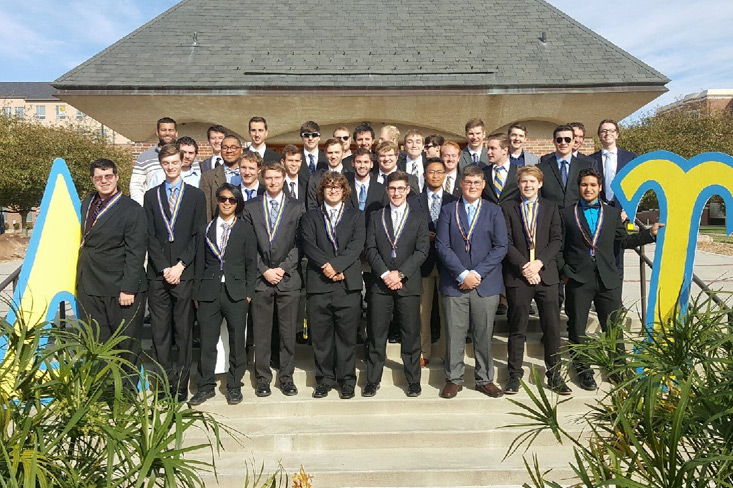Funding Sources and Policies
The Foundation’s commitment to donor stewardship and maximizing annual educational grants to the Fraternity.
Annual Loyalty Fund
The Annual Loyalty Fund is the Foundation’s most critical need because it helps make possible the educational programming, resources, staff and local chapter support needed for the Fraternity to live out its mission of Building Better Men. Gifts to the Annual Loyalty Fund are unrestricted, and the funds are raised and spent by the Foundation annually. Without our Annual Loyalty Fund donors, the Fraternity’s award-winning educational programs and initiatives would not be possible.
Roughly 1,400 alumni, undergraduates, parents and friends of DU provide nearly $500,000 in tax-deductible gifts to the Annual Loyalty Fund each year. If you are interested in investing in today’s undergraduates through the Annual Loyalty Fund, you can secure your name on this year’s donor list with an online gift, here.


Short-Term Chapter Restricted Funds
The Educational Foundation also relies on various short-term chapter restricted funds to support the educational demands of the Fraternity. Chapter Educational Accounts (CEAs) and Chapter Housing Accounts (CHAs) are the two most common chapter restricted funds. These funds allow donors to make charitable gifts to the DUEF that are designated for the sole benefit of a local DU chapter.
The entire balance of a CEA or CHA can be used at any time, but as with all gifts to the DUEF, these funds can only be used for educational purposes. Qualified educational purposes include DU educational programming scholarships, tuition scholarships and housing project expenses directly associated with the educational space of a chapter facility. The DUEF staff works closely with local alumni leadership when stewarding any gifts from these types of funds.
For more information on Chapter Educational Accounts or Chapter Housing Accounts, visit the Chapter Grants page.
Endowment Funds
Although the Annual Loyalty Fund and chapter educational/housing accounts provide financial resources for the educational initiatives happening today, the DUEF also has endowment funds that generate grants every year in perpetuity. Chapter Legacy Plans, educational program funds, and tuition scholarship funds, are just a few examples of the various endowment funds supporting our Building Better Men mission.
The DUEF requires a minimum pledge of $25,000 to establish a new endowment fund, and more information on how to establish a new endowment fund can be found on the Named Fund page.

Foundation Policies and Standard Practices
- The policies and guidelines for administering the funds entrusted to the DUEF are designed to honor donor intentions, maximize annual impact on Delta Upsilon’s educational initiatives, and ensure sound financial practices.
- The DUEF’s philosophy for distributing educational dollars from various funding sources includes prioritizing the use of restricted dollars whenever possible to ensure we match the original intent of our donors.
- The DUEF provides annual stewardship reports in the fall to donors who have established an endowment fund (or a designated fund contact if the original donor is deceased or if the fund has multiple contributors). These annual stewardship reports show the fund balance and any contributions/distributions from the fund. Whenever possible, thank you letters from benefitting students will be included.
- All gifts to short-term chapter restricted funds (CEAs, CHAs, etc.), as well as gifts to endowment funds (CLPs, other endowment funds), are assessed a one-time 5% gift acceptance fee on each individual contribution (but not less than $5).
- The DUEF Board of Trustees has established an annual 4% spending policy for all endowment funds, and the annual distribution is calculated using the fund balances of the prior 12 quarters of the previous three fiscal years. This allows a donor or donors to establish an endowment fund that will forever make an impact on future generations of DU undergraduates.
- To cover the cost of stewarding funds each year, the DUEF assesses a 1% annualized administration fee to all short-term chapter restricted funds and all endowment funds (except for CEAs, which do not receive an annual administration fee.). The 1% administration fee is calculated and withdrawn monthly, based on the previous month-end value of the fund.
- Each CEA must have an alumni chapter in good standing and a designated contact person for proper stewardship. A written plan must be submitted at the time a CEA is established that outlines the educational objectives/purposes. In the event a chapter becomes inactive, or has its charter suspended for a period of at least eight (8) consecutive years, the assets in each inactive or suspended chapter's CEA fund will revert to the endowment of the DUEF.
- The DUEF requires a minimum pledge of $25,000 to establish a new endowment fund, and initial distributions from endowment funds occur once $250 or more is available when the 4% spending policy is applied (with the exception of CLPs, which require a minimum balance of $20,000 before any distribution). The DUEF will seek to maximize annual grants from endowment funds and fully utilize the annual 4% spending allotment of each fund whenever possible. This may include awarding additional grants for educational initiatives with unused funding from the 4% allotment. The goal with all endowment funds is to maximize the impact of the 4% spending allotment, while also matching donor intent.
- Unlike CEAs and CHAs, endowment funds are established to provide educational grants in perpetuity. Endowment funds (including CLPs) are subject to interest gains/losses corresponding to the Foundation's investment portfolio performance. This includes both income and capital appreciation. The Foundation’s investment portfolio is managed by an investment firm which reports directly to the investment committee of the Board of Trustees. The 4% spending policy for endowment funds, combined with smart investment practices, help endowment funds at the DUEF grow in value over time.
- Grant distributions from funds that are fully restricted to specific chapters (CEAs, CHAs, etc.) can occur through one of the online grant request forms (located here). Grant request must be submitted by a key local alumni leader (e.g. Alumni Board President, etc.). All grant request must be approved by the Executive Director and can take up to two weeks to process. Grant distributions from other endowment funds are determined by the DUEF staff in a manner that best matches original donor intent with the current educational needs of the Fraternity.
Questions regarding the policies and practices of the DU Educational Foundation should go to Executive Director Justin Kirk at kirk@deltau.org.
Give to the DUEF Today
Will you join us in Building Better Men for a global society? Your support of the DUEF will help provide educational programming, chapter initiatives and scholarships to young men who will soon lead our world.
